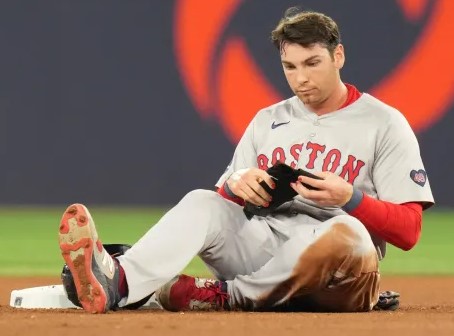“Beyond the Box Score: Triston Casas Opens Up About the Hidden Scars of Body-Shaming in Baseball”
By [Your Name], Boston, MA – July 2025
Triston Casas is 6’4”, 252 pounds, and one of the most promising sluggers in baseball. He’s built like a linebacker, moves with the confident ease of an elite athlete, and when he steps into the batter’s box, pitchers know he can change a game with a single swing.
But to some fans behind the safety of anonymous social media profiles, Casas is not a rising star. He’s a target.
And he’s had enough.
In a quietly powerful interview this week, Casas shared what he calls the hardest part of his young career—and it has nothing to do with hitting a 98 mph fastball.
“You can’t imagine what it feels like to scroll your phone after a game and see thousands of strangers calling you ‘Fatston Casas,’” he said, voice catching. “It makes you feel like you’re not a person. Just a body to judge.”
When the Game Becomes Personal
Casas, 24, has always been bigger than most players. His frame was one reason scouts projected him as a power bat. But during a recent stretch when he was mired in a slump—hitting .180 over three weeks—criticism shifted from his batting average to his body.
Some of the messages were almost absurd in their cruelty:
“Try running to first without stopping for a snack.”
“Lose 30 pounds, maybe you’ll hit over .200.”
“Fat slugger. Embarrassment.”
He tried to shrug them off. He tried to ignore them. But each time he picked up his phone, there they were: the same insults, amplified by retweets and snide memes.
“It’s like death by a thousand cuts,” he said. “I’d rather someone throw a baseball at me 100 times than read some of the stuff I’ve seen.”
Behind the Curtain
Casas isn’t the first athlete to be body-shamed. He likely won’t be the last. But the combination of baseball’s obsession with ‘old-school toughness’ and a modern culture of instant online feedback makes the scrutiny feel inescapable.
Red Sox manager Alex Cora, who has managed some of the sport’s biggest personalities, says he worries about the psychological impact on younger players.
“When I played, you had sports radio,” Cora explained. “But now, guys can’t get away from it. They open Instagram or Twitter and see comments about their weight, their families, their worth as human beings.”
And Casas is still learning how to cope.
He admitted to spending long nights alone in his apartment after games, replaying every at-bat and reading every mention of his name.
“It started to consume me,” he said. “I was measuring my value as a man by what people said about my size.”
More Than a Game
Body-shaming in baseball isn’t new. From Babe Ruth to CC Sabathia, big-bodied stars have always inspired cheap shots. But Casas’ experience shows how relentless it can be in the era of viral memes and sports gambling.
In May, an especially cruel TikTok compilation titled “Fatston Strikes Out Again” amassed nearly 500,000 views in 48 hours. Friends sent him screenshots. He tried to laugh it off, but inside, he was spiraling.
He says the worst moment came during a road trip in Houston.
“I remember walking into the dugout and feeling like I couldn’t breathe,” Casas said. “Like everyone in the stands was thinking the same thing: that I was worthless.”
After the series, he finally did something he’d never done before: he called the Red Sox team psychologist.
A Quiet Step Toward Healing
According to sources in the organization, Casas has been meeting weekly with a counselor. He’s also started limiting his social media use and surrounding himself with teammates who remind him that his value isn’t measured in hashtags or GIFs.
Veteran reliever Chris Martin is one of them.
“I told him: You’re here because you’re good,” Martin said. “You have power nobody else has. Screw the noise.”
Fans, too, have begun to rally around him. When Casas homered last week at Fenway, a group of supporters held a hand-painted banner:
“STRONGER THAN THE HATE.”
The crowd erupted in cheers.
After the game, Casas finally smiled when a reporter asked what that moment meant.
“It reminded me that there are good people out there,” he said. “People who see the human being behind the uniform.”
The Larger Conversation
Casas’ willingness to share his story has ignited a broader discussion across baseball media. ESPN devoted a segment to the mental health crisis among young athletes. The Players Tribune published an op-ed praising Casas’ vulnerability as an act of courage.
And inside the Red Sox clubhouse, teammates say his honesty has inspired others to be more open about their own struggles.
“Some guys will never admit how much this stuff hurts,” said an anonymous teammate. “But Triston did. And that took guts.”
Beyond the Box Score
On the field, Casas will continue to be judged by batting averages and slugging percentages. That’s the nature of the game.
But off the field, he’s hoping to be remembered for something bigger:
“I want people to know that it’s okay to talk about this,” he said. “You can be strong and still be vulnerable.”
As he stood in front of his locker, hands clasped behind his back, Casas looked up and offered a quiet final thought.
“At the end of the day,” he said, “I’m just a guy who loves baseball. And I’m learning that’s enough.”
